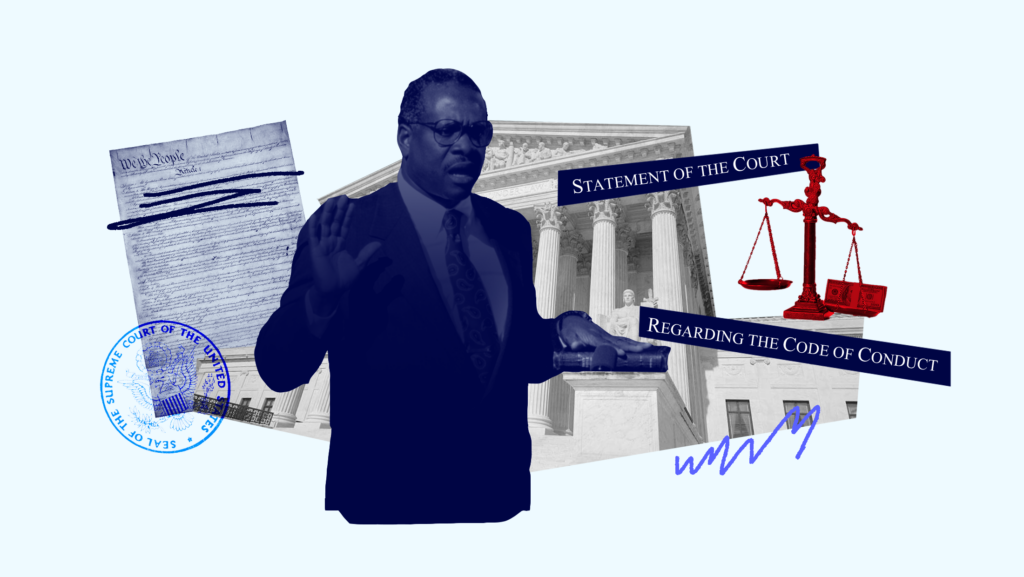The Supreme Court Just Admitted That Public Pressure Is Working

Alliance for Justice (AFJ) has long advocated for a Supreme Court code of ethics — since well before this year’s revelations about Justice Clarence Thomas and Samuel Alito’s cushy relationships with conservative billionaires. For decades, all lower court judges have had specific rules to follow, but not so for the highest court in the land — until last month. After intense pressure from advocates and the public, the Court issued its first-ever Code of Conduct for Justices of the Supreme Court of the United States.
Unfortunately, this new code has given us little reason to adjust our advocacy. Indeed, the one silver lining is that seemingly everybody immediately noticed how this new code is a farce. Polling after the code was issued found that it hardly convinced anyone.
Three out of four voters agreed that “Congress should pass a stricter code of ethics for the Supreme Court that does not leave the justices to police themselves, and Congress should investigate the ties between justices and political mega donors.” That included 90% of Democrats, 70% of independents and even 57% of Republicans. The Court truly is fooling no one.
The problems with the code boil down to the fundamental lack of accountability. Put simply, there is no means of enforcing this code of conduct. So, if a justice violates it? Oh well!
And when one reviews its contents, it raises the question: What is there to violate? The document is replete with statements about what a justice “should” do instead of what they “shall” or “must” do. That makes this code a mere suggestion, rather than a set of requirements that ensure integrity and thus respect for the rule of law.
Honor is the Court’s currency, and it can’t function if the nation perceives it as untrustworthy.
The icing on this cake: Justices must “knowingly” violate several of the code’s hints at ethics. If recent experience teaches us anything, we are just inviting the justices to plead ignorance — and then immediately forgive themselves and one another. Indeed, this new code excuses all of the behavior for which the justices are currently under fire, including Thomas’s deep financial ties to Harlan Crow, Alito’s luxury fishing trip with Paul Singer and Chief Justice John Roberts’ wife recruiting attorneys to law firms with cases before the Court.
So what is the significance of the Court issuing such a code? Is an empty victory still a victory?
I believe so.
First of all, it is still historic for the justices to acknowledge that they should, in fact, be bound by a code of ethics. The Court existed for over 230 years without a code of ethics of any kind. The fact that it now has one is an admission that limits can be placed on the justices. They chose to impose some rather flimsy suggestions on themselves, but it’s nevertheless proof of concept. Instead of scrutinizing the mere nonexistence of a code, we can now scrutinize the code they have and highlight its deficiencies.
Second, the Court’s publication of this code is a sign that public pressure does work. While the code is tantamount to issuing a press release that says, “Get off our backs!”, it’s nevertheless a confession: The Court is simply unable to ignore a precipitous drop in public trust. Honor is the Court’s currency, and it can’t function if the nation perceives it as untrustworthy.
This code of conduct is a crack in the invincibility the conservative majority believed protected their extreme decisions and the corruption that underlies them. It’s confirmation that the justices truly cannot govern themselves and validation that we need to keep pushing for true accountability.
At AFJ, our asks haven’t changed. Thomas must resign. All of the justices’ corrupt behavior must be investigated. And Congress must pass a code of conduct to govern the behavior of the justices. If the justices are unable and unwilling to save themselves and the rule of law, we must do it for them.
Rakim Brooks is a public interest appellate lawyer and the president of Alliance for Justice. As a contributor to Democracy Docket, Brooks writes about issues relating to our state and federal courts as well as reforms to our judicial systems.